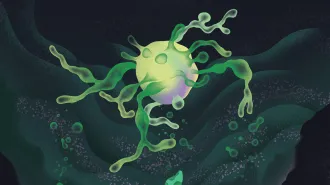They’re calling Obama the ‘science guy’
Today,John Holdren gave one of his first big public addresses since becoming the president’s science adviser. And while Holdren didn’t reveal any state secrets this morning (no surprise), he did confirm what most people attending the Forum on Science and Technology Policy hoped to hear: that Barack Obama is indeed one of the most enthusiastic science-ophiles to enter the White House since Jimmy Carter.
House Science and Technology Committee chairman, Rep. Bart Gordon (D-Tenn.), another speaker at the forum, also described the president as anything but bashful regarding his passion for research and its fruits. Shortly after Obama’s inauguration, Gordon reported, the president phoned to inform him “I’m a science guy.”
And Holdren bolstered that claim by recounting what Obama has done during his first 100 days in office. Such as put a big pot of money in the Stimulus package for research; commit to bringing health costs down even as the delivery of care improves; and elevate political support for technology and innovation.
In recent years, the United States has lacked a comprehensive formal policy to promote innovation, Holdren acknowledged, although “we had a lot of policies that bear on that” — like a research-and-experimentation tax credit. The president recently pledged to make that tax credit permanent. “That’s a big piece of national innovation policy,” Holdren says. Even the president’s creation of a new White House position — chief technology officer — “is seen by the private sector as a major step” to promote innovation, says Holdren.
Obama announced his CTO candidate — Aneesh Paul Chopra — during the president’s weekly radio address on April 18. Until now, Chopra has been Virginia’s tech czar, where the White House says he has worked “to effectively leverage technology in government reform” and promote the state’s innovation agenda. If confirmed by the Senate, Chopra would join the Office of Science and Technology Policy, or OSTP, which Holdren directs.
But what would Chopra do? “The CTO is assistant to the president,” Holdren explains, and associate director of OSTP for technology. As such, “he’s going to have direct access to the president,” Holdren says — and be able to draw on the support of agencies across the federal government to develop “specific initiatives that will support and enhance innovation in the United States” with the goal of “positively influencing the economy.”
But the president recognizes that there will be no money for innovation without a transformation of public perceptions of science. That research is not a luxury but an investment in the development of new ideas, new products and new services, Holdren said. Moreover, there’s no hope of competing with other industrial nations if more American students don’t seek higher education and prepare for high-tech careers. And that, Holdren says, is why investments in science and math education play such a pivotal role in the Obama strategy for reinvigorating the U.S. economy.
When Obama hears about science, Holdren says, “He lights up.” But when kids are involved “he lights up with increased wattage.” The president just can’t wait to communicate that thrill he gets about science, says Holdren.
One anecdote that he shared: The science adviser was briefing Obama in the Oval Office on what to expect shortly, when the president would speak with astronauts aboard the International Space Station. At some point, recalls Holdren, “I told him there were a bunch of middle-school science students in the room [where the call to space would take place].” Immediately, he says, Obama jumped up and said: “Then let’s go!”
The Prez marched over to start talking with the kids. And later, when the astronauts got on an audio feed to the White House, Obama made a point of handing his microphone back over his shoulder so that the kids could get the thrill of talking directly to the space crew.
Now how cool is that? Which was, of course, the point. The kids in that room may have a hard time figuring out what was the high point of their visit: chatting with Obama or the orbiting astronauts. And that encounter might just kindle an interest in astronomy or engineering.
Indeed, I credit the visit my dad and I took to hear John Glenn speak at a local university — I must have been about 12 at the time — to sparking my excitement in astronomy (my initial college major). So I know from personal experience that these chance events can indeed prove meaningful and consequential.
The S&T Policy forum underway today and tomorrow in Washington, D.C. is sponsored by the American Association for the Advancement of Science.







